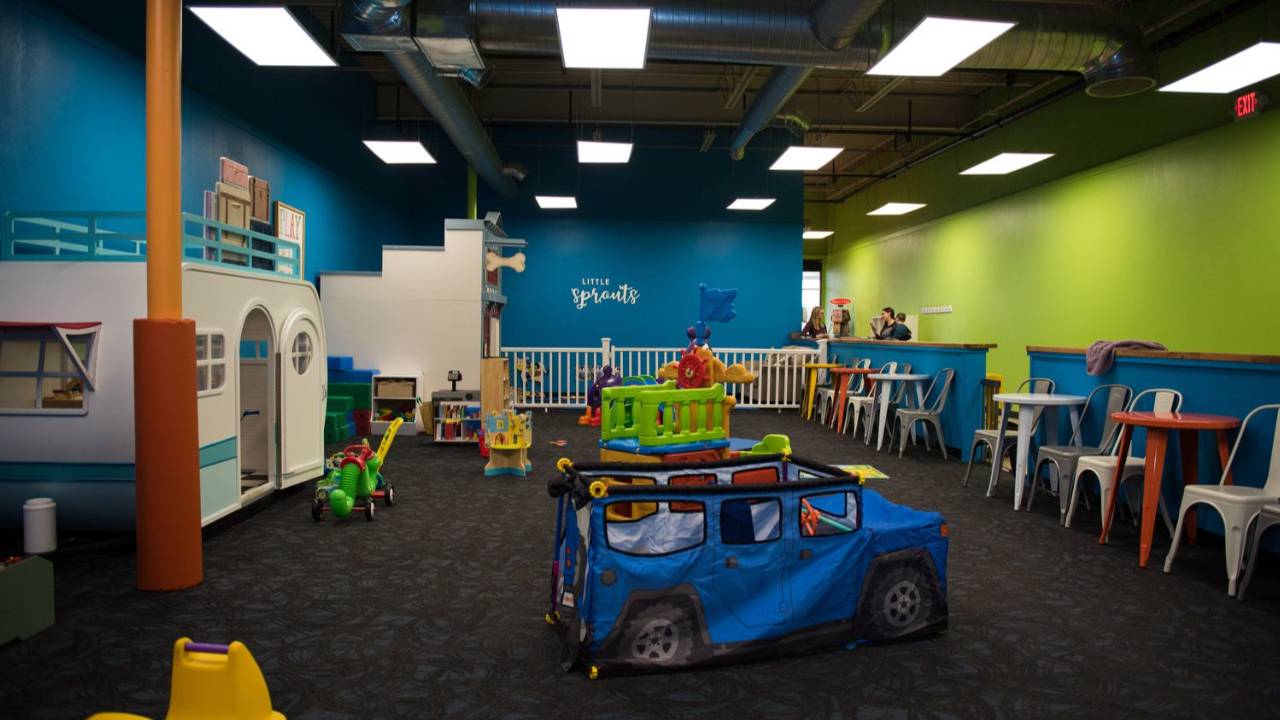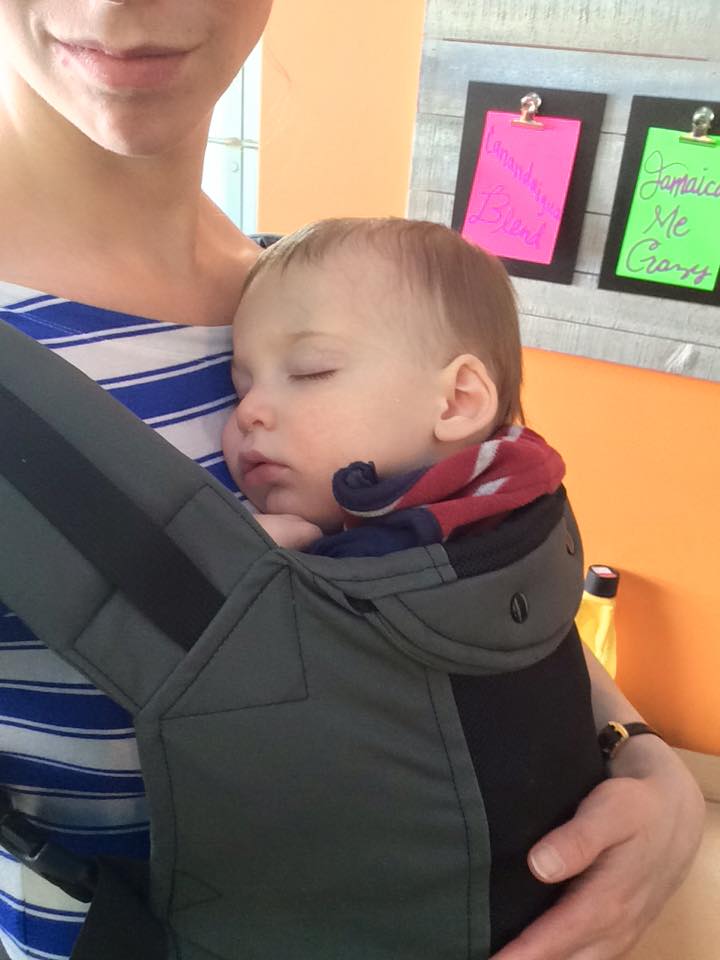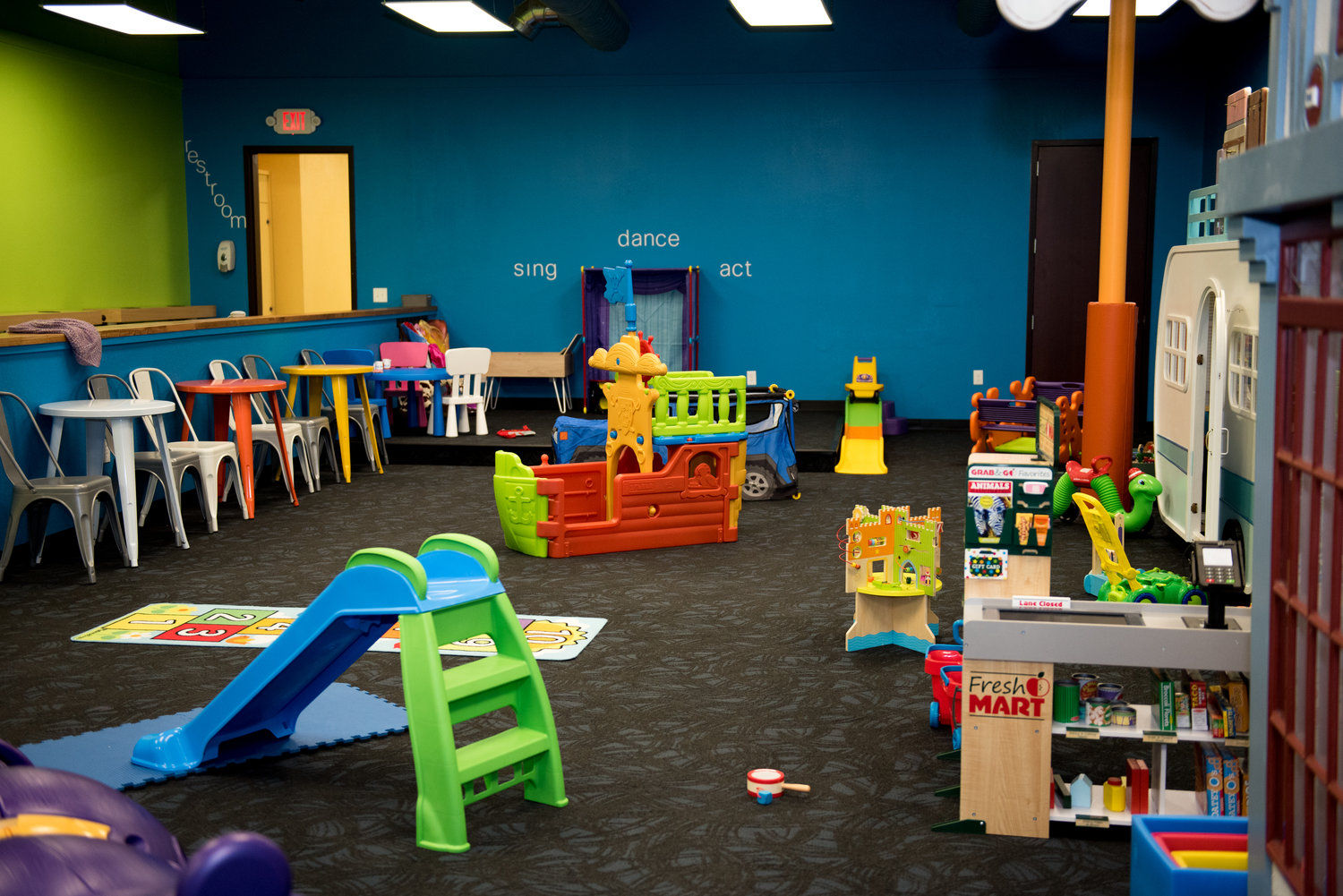The 4 Biggest Mistakes I Made When Licensing My Indoor Playground Business Concept

In this article I want to talk about 4 mistakes I made with our indoor playground licensing agreement, so you can hopefully avoid them in the future.
And these tips will be relevant whether you’re leaning towards the franchising or licensing route. if you're not sure if licensing or franchising your indoor playground is for you-- I have another article here you can check out!
Alright, so a little background and context.
At this point in our journey, we are about 2-2.5 years into owning our indoor playground business and our play cafe was absolutely bursting at the seams. We finally broke through to a place (through tweaking our business model, marketing ,and messaging) where every single day we were at capacity, all of our events were selling out, and we were booked up at least 3 months in advance for parties.
And while competitors and “copy cats” seemed to be popping up left and right, I felt confident we were offering something unique and special enough to continue to differentiate ourselves amongst them, even if we decided to open up another location.
So we searched for a space on our own for several months, but I will be honest with you. I had a toddler and an infant with special needs that required a lot of extra medical appointments and care, and while I KNEW we could expand our reach and profits with another location, I just was not really willing or capable at the time to do it all myself.
That’s when a local Mom, who happened to be a regular customer, reached out to me and shared that she and her husband had also been looking to open up a play space, and she was looking for some advice and to buy some consulting time.
And after speaking with her I was really excited because her vision was really similar to what we already had at our play space and their values seemed to align with our own, so after discussing, she and her husband decided to entertain the idea of opening a licensed location of our brand.
She was really motivated by her own busy life, she had 3 kids, one of whom was also going through some really serious health issues, and while she wanted to serve her community in this way and create wealth and a legacy for her family, it just did not appeal to her at the time to start completely from scratch with NO brand recognition, NO customer base or list– things like that.
So after much negotiation and having our business and financial reports and tax returns evaluated– we finally signed a licensing agreement– which you have access to if you’re in Play Maker Society to use as a starting-off point or as a template if you wish– and they got started.
And this ended up being an absolute dream deal for me because we actually added a clause in the contract that they would take over our original location around the end of our lease… something I already had in my mind I wanted to do.
By the end of our lease both of my kiddos would have been aged out of our play area and I just knew that, while I absolutely loved the 5 years of running our space, I knew I’d be ready for the next chapter when my kids were no longer able to or interested in coming to work with me.
So I was really excited that I would be able to help this family build a legacy and build these assets while also allowing myself that perfect transition I was seeking when I was ready.
And it was even MORE perfect because they lived just down the road from the town we were already seeking to open in, and she knew the area and the people well, and her husband had established himself as a successful restaurant manager in the community so I felt really good that I made the perfect choice when it came to who would be expanding my business. And , like I said, this was a very regular customer, she brought her 3 kiddos in all the time and she was never anything but amazing.
One time, when I was working alone with my (very heavy) infant due to an employee call-off, I forgot my baby carrier which was the absolutely ONLY way I could successfully serve customers and parent the clingiest baby ever at the same time. So I posted in our local moms FB group and she drove like 20 or so minutes to bring me her baby carrier and let me tell you, in that instance she was my guardian angel.

So we had a LOT of experience with this family before we ever started discussing this, so the next few steps happened pretty quickly.
And by the way, I want to preface this conversation by saying that this article is not and WILL not be me doing anything except accepting blame for my own actions.
I truly have nothing bad to say about the family we entered this agreement with, even though– spoiler alert– the location ended up closing down unceremoniously during COVID.
None of the faults I will be discussing in this episode can be pushed onto them, these mistakes were 100% my own and since I am only in control of my own actions, that’s what I’m going to be talking about today and that’s the perspective this article is going to take.
Alright, here are the 4 major mistakes I made throughout this process that led, in-part, to our licensed location failing.
1) We Had An Overly Simplified Licensing Agreement That Lacked Build Out Requirements
The first thing I did when this family decided they were interested in opening up a licensed location was hire a lawyer. Luckily the firm we had been working with on-and-off since the beginning of our business has an attorney on their team who specializes in licensing and franchising, something I would definitely recommend looking for when you go through this process.
And again, no shade or fault to this attorney. This one is all on me. When I asked him to put together a licensing agreement, he used a really basic and simplified version. And that’s why, when I shared this agreement template with my Play Maker Society members, I included a training about what I’d recommend adding to that base template to make it much more robust and specific.
So while it outlined the initial and ongoing fees and the responsibilities of each party, it really lacked detail in a few areas.
For example, our licensing agreement had no specific build-out specifications.
We did not put in any specific stipulations around the build out process to ensure a consistent vibe and customer experience across locations. When we were discussing the build out process and sharing all of our costs and numbers, we did discuss what they envisioned for the space, and we were in total agreement.
And they seemed to really understand again the costs associated with build out. But what I didn’t know at the time, was that they were very sure they could slash their build out costs by doing a lot of the work themselves.
While we did have some requirements around colors and branding that needed to be used, there were no specifications around materials or vendors.
This led to some corners being cut and different (looking and feeling) materials being used, creating a lack of cohesiveness between the two locations. For example, our first location had multi-colored green padded carpet in the play area since it was themed to look like a village. The owners of the licensed location chose a black carpet that you’d typically find in a vestibule, likely since it was the cheapest option available.
While it did prove to be durable, it definitely shifted the overall look and feel of the play area.

We also did not specify any requirements for the layout of the space, which caused some mistakes to be made, including placing the ONLY bathroom in the facility inside of the private party room. That means that if a party was happening during open play, the open-play customers were constantly going in and out of the party room to use the bathroom. This was one layout factor that really prevented the space from booking the same premium-priced parties.
The licensed owners also ended up attempting to save money by doing much of the work themselves, creating some quality concerns as well as delaying the opening by several months. If I could go back, I would definitely add in some approval checkpoints where we could have helped prevent these issues as licensors AND required that all work be completed ONLY by licensed contractors.
2) Our Licensing Agreement Lacked Support Specifics
While our overall responsibilities as licensee and licensor were detailed in our agreement, there was not nearly enough language around how each of us would actually fill our roles.
So example, our agreement included a quarterly fee to be paid by the licensee in exchange for…
- Website management
- Organic Social media support
- Email marketing assistance
- Advertising
But we didn’t mention….
- How often these website changes could be made
- What tools we’d use to post or where we’d get the content
- How often we’d be sending emails and what would be included, and where we would get the emails from
- How much we would spend on ads and what their expectations could be surrounding results
So if I could go back and redo our agreement, I would instead provide more marketing strategy, direction, and templates, but NOT direct support.
I would also put some specifics around how and when we would support them, as well as address what would happen should the licensees fail to pay their quarterly support fee.
Unfortunately, the licensees never ended up paying their quarterly fee, allowing the debt to us to creep up. However, we as the licensors were in a predicament. We were still highly motivated for them to succeed and therefore to support them, since future franchising or licensing opportunities hinged on the success of this first licensed location.
This led to me (regrettably) doing MANY hours of work and support for free– something I regret to this day. But I *REALLY* wanted them to do well, even if they weren’t paying me on time (or at all).
Our licensing agreement also lacked guidance around business changes and consistency amongst locations.
And I know back in episode 173 of the Profitable Play Podcast I mentioned that increased flexibility and autonomy was one of the main factors that motivate people to open licensed locations instead of a franchise one.
But this family ended up being ALL over the map when it came to business changes. She was constantly running sales and not specifying which location it was for, she changed her prices every other day, she was rapid-fire changing what was included in her party packages, and it just seemed like an disorganized mess from the outside looking in.
And while we were supporting them on the social media side, it was very common for them to just find a random graphic or photo online and throw it up on their instagram without much thought or strategy.
And while, in a perfect world, we’d like to hope our customers understand that licensed locations are independently operated, this definitely deeply affected us in terms of brand reputation.
3) Our Licensing Agreement Was Difficult To Enforce
There were many, MANY breaches in our agreement on behalf of the licensee, but there wasn’t much I could really realistically do about it as the licensor because of the terms I myself had signed and put into place.
And you might be wanting to scream at me right now because you’re probably thinking, “MICHELE! Stand up for yourself, if someone is in breach of contract you can NOT allow that, you talk about boundaries and standing firm in your polices and procedures all the time”...
And yeah, you’re right. If everything were black and white in the real world, holding them in violation would certainly have been the easy and clear answer to this issue.
But in reality, this is SO far from black and white. Not only were they going through extreme health challenges with one of their children which obviously made me feel extremely generous and compassionate towards them, it was also very much in my best interest to see them succeed so we could motivate people to open MORE licensed locations in the future and so they could eventually take over our original location as planned.
So in a licensing agreement, there are typically 4 ways to handle contract violations.
- Litigation: If the licensee violates the licensing contract, the licensor can take legal action to enforce the contract terms. This involves taking the matter to court and suing the licensee for breach of contract.
- Negotiation: If a licensee is found to be in breach of the licensing contract, the licensor may choose to engage in negotiations to resolve the issue. This could involve renegotiating the terms of the agreement or agreeing on a settlement amount to resolve the dispute.
- Termination of the license: If the licensee violates the terms of the licensing contract, the licensor may choose to terminate the license. This will prevent the licensee from continuing to use the licensed product or service, and may also include legal action to recover any damages.
- Mediation or arbitration: Mediation or arbitration can be used to resolve disputes between the licensor and the licensee. This involves the parties agreeing to use a neutral third party to facilitate a resolution.
But guess what? ALL of these options are expensive and time consuming.
What I wish I would have done is gotten a little creative and put some resolution options in place to help resolve issues that were not quite needing to be escalated to the courtroom.
For example, I wish I would have put a plan in place to transfer their website or social media responsibilities to a point person on their team should they not be paying. Or I wish I would have provided some other alternate solution that would NOT have resulted in us working for free.
So when you’re going through this I want you to look at every single requirement you are outlining and ask yourself, what should happen if this one line item isn't followed? What if it’s not followed once? How about 2 times? What if it’s consistently not being followed? This can seem like a tedious process but I promise you it’s worth it.
And that brings me to my final point (or mistake, I should say)
4) Our Licensing Agreement Had No Plan B For The Licensee
Things happen. None of us are immune to the unexpected. I’m sure by now you’ve heard about the hypothetical milk-truck scenario. Which in business, means that hypothetically, a milk truck can take anyone out at any given time.
And while the possibility of an actual milk truck coming and running us over is pretty slim, there are things that can come up that render us unable to continue operating our businesses. Maybe your spouse gets a new job out of state and you need to move. Maybe there is a family member that requires more of your attention and time than anticipated. Or, like it happened in this case, maybe there is a serious health challenge with one of your immediate family members that makes it not possible to continue.
Again, while I won’t be giving any specifics here since it’s not my story to share, the child of this family went through a second serious health episode about 2 years after opening and he was inpatient in the hospital for a time and then just too medically fragile to be mixed in with the public, especially during a global pandemic.
And we had no back up plan. And they didn’t either. And while I cannot even come close to issuing blame on them for quickly deciding they weren’t going to honor their contract, I wish we had planned for these types of unexpected scenarios.
For example, if there was a plan in place to give them some guidance around selling, subletting, or licensing out their space, maybe they would have seen a light at the end of the tunnel and instead of closing up shop, transferred their obligations properly to another interested family or business.
They were doing extremely well and they already were starting to transition into operating our original location and it was heartbreaking to see all of that come to a screeching halt during the pandemic.
Because now not only were they having to now deal with breaking their lease and the financial obligations that comes with that process, we were also left owed tens of thousands of dollars. Not just from the original agreement, but also because we had sold them many of our business assets already and not collected payment yet. And luckily our lease was up, but still– there were so many plans and aspirations that just did not come to fruition because we just weren't prepared to navigate this.
So in my experience, while it's difficult to anticipate or even think about these hardships, it’s completely necessary for both parties.
Are you planning on licensing or franchising your indoor playground business? Let me know in the comments!



